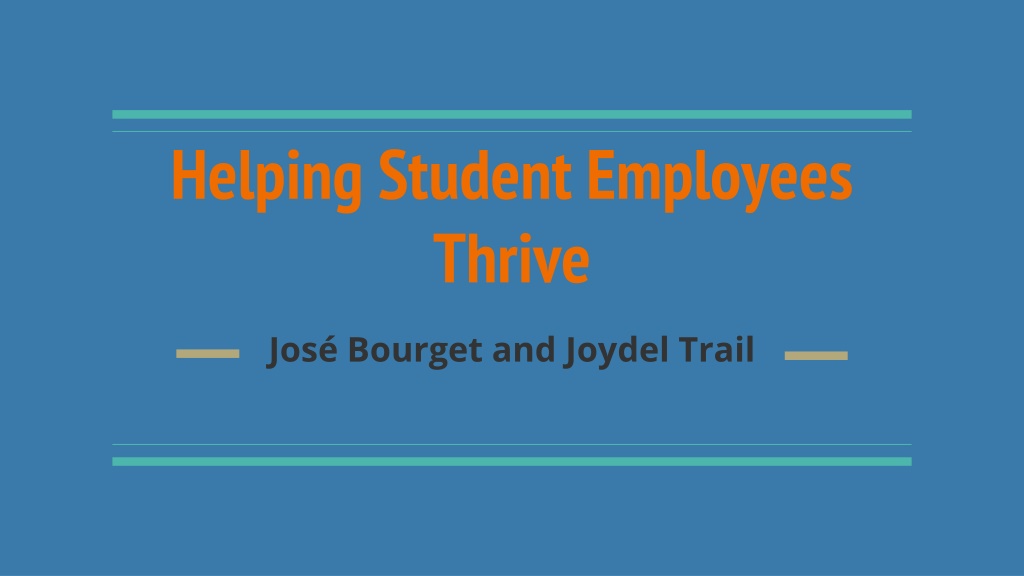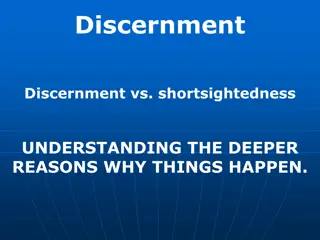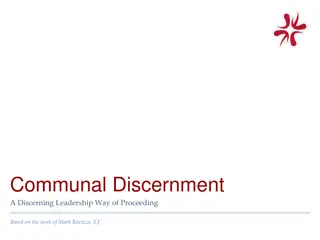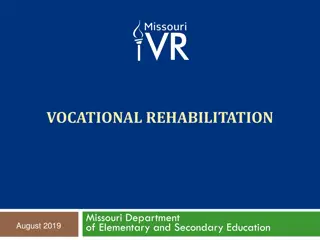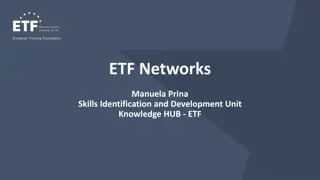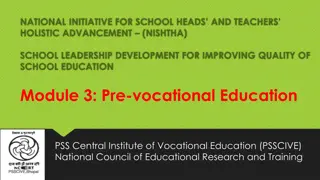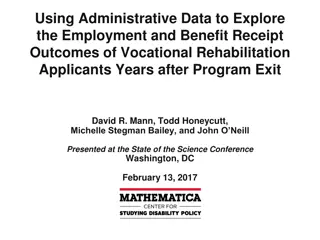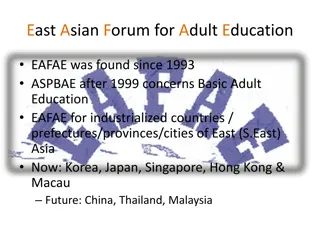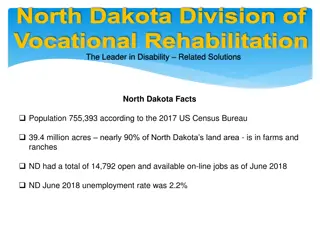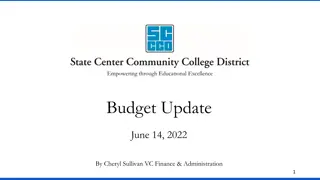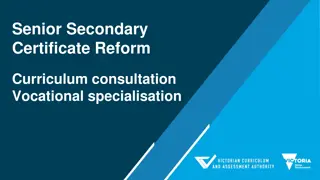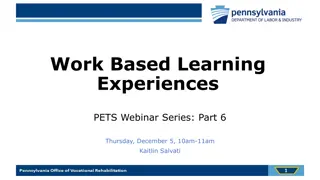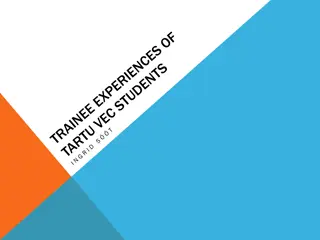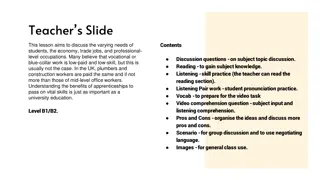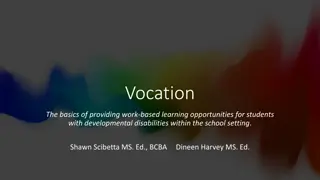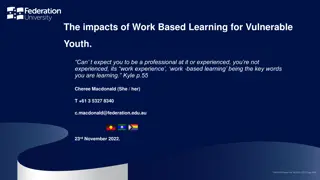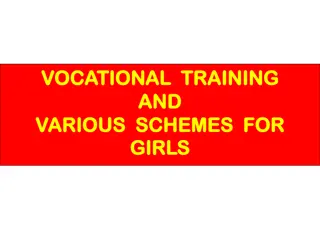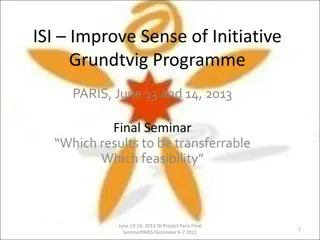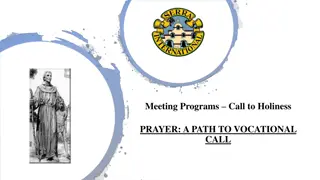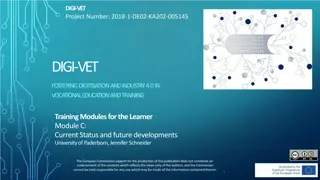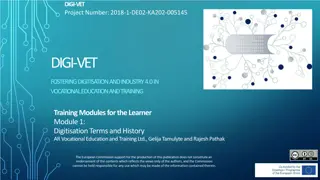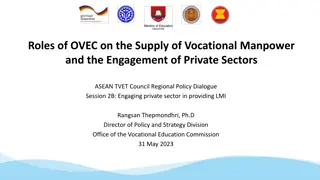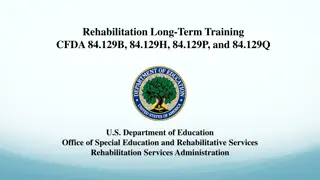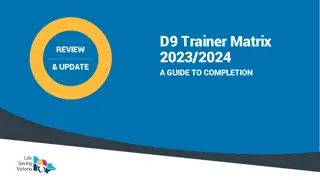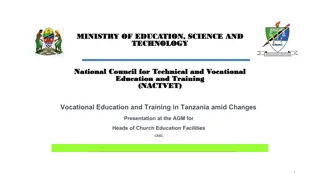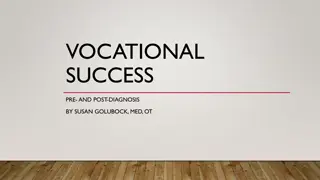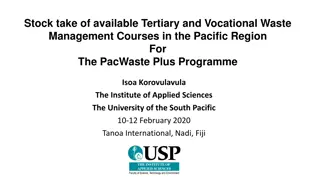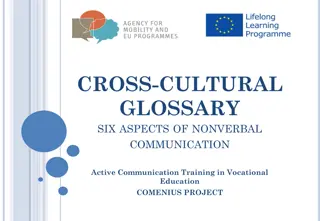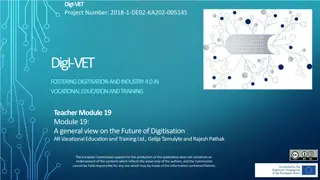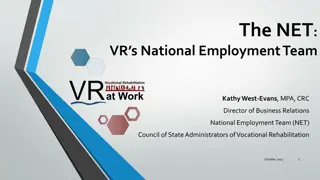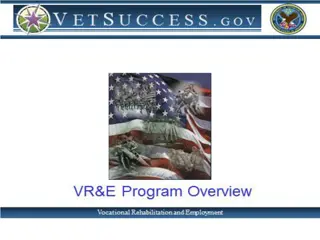Empowering Students Through Vocational Discernment
Discover the significance of vocational discernment in guiding students towards a purposeful life. Explore the essence of vocation, its Biblical foundations, and how Adventist education emphasizes the development of virtues and God-given talents to shape well-rounded individuals.
Download Presentation

Please find below an Image/Link to download the presentation.
The content on the website is provided AS IS for your information and personal use only. It may not be sold, licensed, or shared on other websites without obtaining consent from the author. Download presentation by click this link. If you encounter any issues during the download, it is possible that the publisher has removed the file from their server.
E N D
Presentation Transcript
Helping Student Employees Thrive Jos Bourget and Joydel Trail
Vocational Discernment A vocation is an approach to a particular life role that is oriented toward demonstrating or deriving a sense of purpose, or meaningfulness, and that holds other-oriented values and goals as primary sources of motivation. (Dik & Duffy, 2009) Why am I here? In this city? In this job? In this church? In this club? In this group? Where should I be going? What should I be doing? How should I be living my life?
Vocation - A Biblical Basis I therefore, the prisoner of the Lord, beseech you that ye walk worthy of the vocation wherewith ye are called, Ephesians 4:1 KJV As a prisoner for the Lord, then, I urge you to live a life worthy of the calling you have received. Ephesians 4:1 NIV
Vocation - Adventist Education God will accept the youth with their talent and their wealth of affection, if they will consecrate themselves to Him. They may reach to the highest point of intellectual greatness; and if balanced by religious principle, they can carry forward the work which Christ came from heaven to accomplish.
Vocation - Adventist Education The students at our colleges have valuable privileges, not only of obtaining a knowledge of the sciences, but also of learning how to cultivate and practice virtues which will give them symmetrical characters. They are God's responsible moral agents. The talents of wealth, station, and intellect are given of God in trust to man for his wise improvement. These varied trusts He has distributed proportionately to the known powers and capacities of His servants, to every man his work.
Vocation - Adventist Education And the Giver expects returns according to the gifts. The humblest gift is not to be despised. Everyone has his peculiar sphere and vocation. He who makes the most of his God-given opportunities will return to the Giver, in their improvement, an interest proportionate to the entrusted capital. The Lord does not reward the large amount of labor. He does not regard the greatness of the work so much as the fidelity with which it is done. The good and faithful servant is rewarded. As we cultivate the powers God has given us, we shall increase in knowledge and perception. Counsels to parents, teachers, and students pg 512
The importance of Vocational Discernment for students Capabilities Present Activities Goal Setting Decision making Recognizing God-given opportunities Preparation and Effort
GOV Overview NetVUE grant Leverage student employment Mentorship Vocational discernment
Benefits for students Experiential learning Mentorship Possible future opportunities Professional networking Potential financial gain
Benefits for supervisors Opportunities for future, full time employee talent pool Advancement of AU Strategic Plan Enhanced leadership skills Attractive incentive for recruitment Access to lunch and learns (Oct. 18, Nov. 8)
Spring 2023 Pilot CFE Student Employees SkillSurvey evaluation 39 students, 92.9% would work with students again
Career Readiness Ratings at a Glance - Evaluator Feedback Highest rating behaviors 1.Treat other people, including those of different backgrounds, beliefs, and gender, with fairness and respect 2.Show a high level of dedication toward doing a good job 3.Demonstrate dependability (e.g., report consistently, and on time, for work or meetings) 4.Write in a way that conforms to the basic principles of spelling, grammar, and punctuation 5.Have an attention to detail, resulting in few if any errors in their work Lowest rating behaviors 1.Accurately summarize and interpret data 2.Use innovative thinking to go beyond traditional methods 3.Use technology to improve efficiency and productivity of their work 4.Show an awareness of own strengths and areas for development 5.Multi-task well in a fast-paced environment
How it works Student Employee supervisor opt-in Identify NACE competencies for mentorship Semesterly 2-hour orientation Conduct monthly, 20-minute 1:1 or group mentorship meetings Student evaluations Students participate in professional development (led by Career Center, CFE, Dept. of Religion) Speaker Series, Lunch and Learns, Career Coaching Sessions, Reflection exercise
How to participate Submit Going on Vocation Application Form www.andrews.edu/go/career Going on Vocation page Deadline: Sept. 1 Contact: Joydel Trail joydel@andrews.edu, (269) 471-6214
